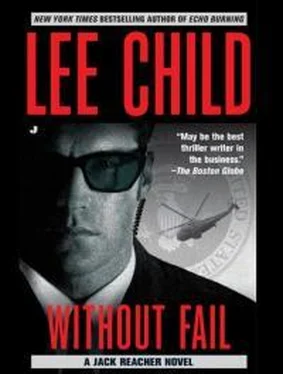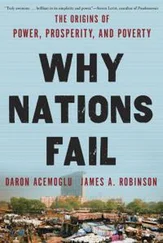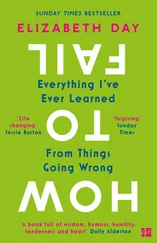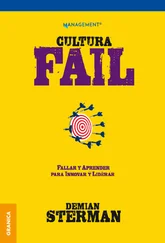Ли Чайлд - Without Fail
Здесь есть возможность читать онлайн «Ли Чайлд - Without Fail» весь текст электронной книги совершенно бесплатно (целиком полную версию без сокращений). В некоторых случаях можно слушать аудио, скачать через торрент в формате fb2 и присутствует краткое содержание. Жанр: Крутой детектив, Триллер, на английском языке. Описание произведения, (предисловие) а так же отзывы посетителей доступны на портале библиотеки ЛибКат.
- Название:Without Fail
- Автор:
- Жанр:
- Год:неизвестен
- ISBN:нет данных
- Рейтинг книги:3 / 5. Голосов: 1
-
Избранное:Добавить в избранное
- Отзывы:
-
Ваша оценка:
- 60
- 1
- 2
- 3
- 4
- 5
Without Fail: краткое содержание, описание и аннотация
Предлагаем к чтению аннотацию, описание, краткое содержание или предисловие (зависит от того, что написал сам автор книги «Without Fail»). Если вы не нашли необходимую информацию о книге — напишите в комментариях, мы постараемся отыскать её.
The secretive, closed organization that invites Jack Reacher in is the Secret Service, the organization that protects the Presidency. Someone who was once close to Reacher’s brother, needs help in her new job. Her new job? Saving the Vice President of the United States from being assassinated.
Without Fail — читать онлайн бесплатно полную книгу (весь текст) целиком
Ниже представлен текст книги, разбитый по страницам. Система сохранения места последней прочитанной страницы, позволяет с удобством читать онлайн бесплатно книгу «Without Fail», без необходимости каждый раз заново искать на чём Вы остановились. Поставьте закладку, и сможете в любой момент перейти на страницу, на которой закончили чтение.
Интервал:
Закладка:
Reacher said nothing.
“So will you help me out?” she asked.
“What was he like? As a boss?”
“He was terrific. He was a superstar, professionally.”
“What about as a boyfriend?”
“He was pretty good at that, too.”
Reacher said nothing. There was a long silence.
“Where have you been since you left the service?” Froelich asked. “You haven’t left much of a paper trail.”
“That was the plan,” Reacher said. “I keep myself to myself.”
Questions in her eyes.
“Don’t worry,” he said. “I’m not radioactive.”
“I know,” she said. “Because I checked. But I’m kind of curious, now that I’ve met you. You were just a name before.”
He glanced down at the table, trying to look at himself as a third party, described secondhand in occasional bits and pieces by a brother. It was an interesting perspective.
“Will you help me out?” she asked again.
She unbuttoned her coat, because of the warmth of the room. She was wearing a pure white blouse under the coat. She moved a little closer, and half-turned to face him. They were as close as lovers on a lazy afternoon.
“I don’t know,” he said.
“It’ll be dangerous,” she said. “I have to warn you that nobody will know you’re out there except me. That’s a big problem if you’re spotted anywhere. Maybe it’s a bad idea. Maybe I shouldn’t be asking.”
“I wouldn’t be spotted anywhere,” Reacher said.
She smiled. “That’s exactly what Joe told me you’d say, eight years ago.”
He said nothing.
“It’s very important,” she said. “And urgent.”
“You want to tell me why it’s important?”
“I’ve already told you why.”
“Want to tell me why it’s urgent?”
She said nothing.
“I don’t think this is theoretical at all,” he said.
She said nothing.
“I think you’ve got a situation,” he said.
She said nothing.
“I think you know somebody is out there,” he said. “An active threat.”
She looked away. “I can’t comment on that.”
“I was in the Army,” he said. “I’ve heard answers like that before.”
“It’s just a security audit,” she said. “Will you do it for me?”
He was quiet for a long time.
“There would be two conditions,” he said.
She turned back and looked at him. “Which are?”
“One, I get to work somewhere cold.”
“Why?”
“Because I just spent a hundred and eighty-nine dollars on warm clothes.”
She smiled, briefly. “Everywhere he’s going should be cold enough for you in the middle of November.”
“OK,” he said. He dug in his pocket and slid her a matchbook and pointed to the name and address printed on it. “And there’s an old couple working a week in this particular club and they’re worried about getting ripped off for their wages. Musicians. They should be OK, but I need to be sure. I want you to talk to the cops here.”
“Friends of yours?”
“Recent.”
“When’s payday supposed to be?”
“Friday night, after the last set. Midnight, maybe. They need to pick up their money and get their stuff to their car. They’ll be heading to New York.”
“I’ll ask one of our agents to check in with them every day. Better than the cops, I think. We’ve got a field office here. Big-time money laundering in Atlantic City. It’s the casinos. So you’ll do it?”
Reacher went quiet again and thought about his brother. He’s back to haunt me , he thought. I knew he would be, one day . His coffee cup was empty but still warm. He lifted it off the saucer and tilted it and watched the sludge in the bottom flow toward him, slow and brown, like river silt.
“When does it need to be done?” he asked.
At that exact moment less than a hundred and thirty miles away in a warehouse behind Baltimore’s Inner Harbor cash was finally exchanged for two weapons and matching ammunition. A lot of cash. Good weapons. Special ammunition. The planning for the second attempt had started with an objective analysis of the first attempt’s failure. As realistic professionals they were reluctant to blame the whole debacle on inadequate hardware, but they agreed that better firepower couldn’t hurt. So they had researched their needs and located a supplier. He had what they wanted. The price was right. They negotiated a guarantee. It was their usual type of arrangement. They told the guy that if there was a problem with the merchandise they would come back and shoot him through the spinal cord, low down, put him in a wheelchair.
Getting their hands on the guns was the last preparatory step. Now they were ready to go fully operational.
Vice President-elect Brook Armstrong had six main tasks in the ten weeks between election and inauguration. Sixth and least important was the continuation of his duties as junior senator from North Dakota until his term officially ended. There were nearly six hundred and fifty thousand people in the state and any one of them might want attention at any time, but Armstrong assumed they all understood they were in limbo until his successor took over. Equally, Congress wasn’t doing much of anything until January. So his senatorial duties didn’t occupy much of his attention.
Fifth task was to ease his successor into place back home. He had scheduled two rallies in the state so he could hand the new guy on to his own tame media contacts. It had to be a visual thing, shoulder to shoulder, plenty of grip-and-grin for the cameras, Armstrong taking a metaphoric step backward, the new guy taking a metaphoric step forward. The first rally was planned for the twentieth of November, the other four days later. Both would be irksome, but party loyalty demanded it.
Fourth task was to learn some things. He would be a member of the National Security Council, for instance. He would be exposed to stuff a junior senator from North Dakota couldn’t be expected to know. A CIA staffer had been assigned as his personal tutor, and there were Pentagon people coming in, and Foreign Service people. It was all kept as fluid as possible, but there was a lot of work to be fitted around everything else.
And everything else was increasingly urgent. The third task was where it started to get important. There were some tens of thousands of contributors who had supported the campaign nationally. The really big donors would be taken care of in other ways, but the individual thousand-dollar-and-up supporters needed to share the success, too. So the party had scheduled a number of big receptions in D.C. where they could all mill around and feel important and at the center of things. Their local committees would invite them to fly in and dress up and rub shoulders. They would be told it wasn’t officially certain yet whether it would be the new President or the new Vice President hosting them. In practice three-quarters of the duty was already scheduled to fall to Armstrong.
The second task was where it started to get really important. Second task was to stroke Wall Street. A change of administration was a sensitive thing, financially. No real reason why there should be anything but smooth continuity, but temporary nerves and jitters could snowball fast, and market instability could cripple a new presidency from the get-go. So a lot of effort went into investor reassurance. The President-elect handled most of it himself, with the crucial players getting extensive personal face time in D.C., but Armstrong was slated to handle the second-division people up in New York. There were five separate trips planned during the ten-week period.
But Armstrong’s first and most important task of all was to run the transition team. A new administration needs a roster of nearly eight thousand people, and about eight hundred of them need confirmation by the Senate, of which about eighty are really key players. Armstrong’s job was to participate in their selection, and then use his Senate connections to grease their way through the upcoming confirmation process. The transition operation was based in the official space on G Street, but it made sense for Armstrong to lead it from his old Senate office. All in all, it wasn’t fun. It was grunt work, but that’s the difference between being first and second on the ticket.
Читать дальшеИнтервал:
Закладка:
Похожие книги на «Without Fail»
Представляем Вашему вниманию похожие книги на «Without Fail» списком для выбора. Мы отобрали схожую по названию и смыслу литературу в надежде предоставить читателям больше вариантов отыскать новые, интересные, ещё непрочитанные произведения.
Обсуждение, отзывы о книге «Without Fail» и просто собственные мнения читателей. Оставьте ваши комментарии, напишите, что Вы думаете о произведении, его смысле или главных героях. Укажите что конкретно понравилось, а что нет, и почему Вы так считаете.











